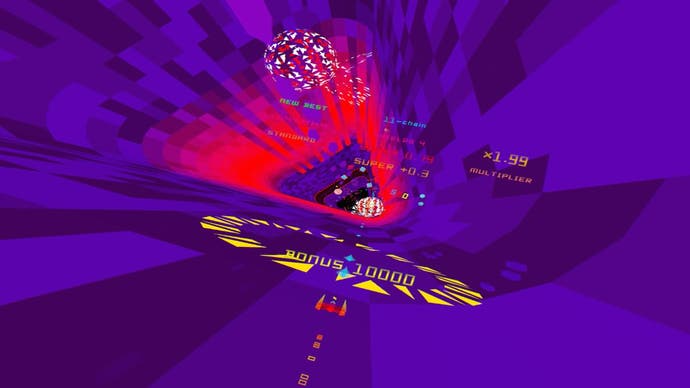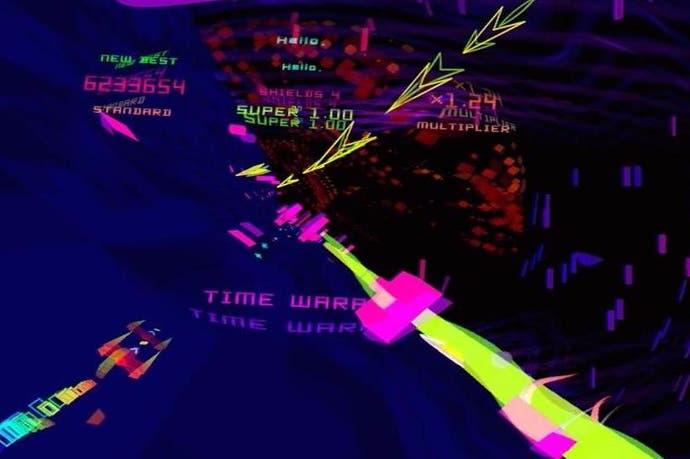Polybius review
Bullseye.
Phosphenes are those lights you see if you press your fingers against your eyeballs for a few seconds. Actually, "lights" doesn't quite do it. Phosphenes often look like cosmic checkerboard tunnels, curving and warping into the infinite distance. They're such a strange sensation, and such a private, insular one, that it can be quite weird to look them up online and find that they have a name, and that everyone gets them. Odd business, really: things that the eyeball decides to see when it has nothing much to look at it; lights flickering and fizzing without the obvious involvement of photons.
Phosphenes make people do funny things. If I understand the story correctly, Newton once stuck a bodkin in his eye to learn more about them - "betwixt my eye and [the] bone as neare to [the] backside of my eye as I could," if we're after precision, which we probably are if we're exploring the territory in which bodkin meets eyeball. And Jeff Minter, another otherworldly genius if ever there was one, has pretty much carved out a career from conjuring light and movement and a sense of infinity, all of it racing out of the darkness.
Polybius, the latest from Minter's micro-studio Llamasoft, has an obvious selling point. Named after a brilliant urban legend about an arcade cabinet that did very bad things to its players, Polybius is the first Llamasoft game that you can stick your head in. It supports PSVR, as well as normal and 3D-enabled tellies. A tiny download - how does all of this fit into 171.8MB, with its peerless frame rate? - it's a wonderfully rich experience. Of course it is. A Llamasoft game you can stick your head in!
Polybius feels like a true heir to Space Giraffe, which is not something anyone should say lightly. But whereas Space Giraffe was a wonderfully complex and technical game in very obvious ways, relying on the correct manipulation of a handful of gloriously elastic showboating systems, Polybius seems to be simplicity itself. You play a little spacecraft forever roaring into the distance, strafing left and right over strange-shaped lands as you blast away at everything that comes at you. The kink here, the point on which the whole thing revolves, is that as you roar into the distance, you have the opportunity to move through neat little gates that boost your speed. The higher your speed, the higher your scoring potential. The job, then, is not just to survive, but to survive while pushing yourself to travel as fast as you can.
Or not, of course. One of the pleasures of being in the company of a master like Minter is that he's been thinking about this stuff for quite a while, and so he's entirely unwilling to dictate the way you approach anything in his games. Your speed is ultimately under your control: racing through those tiny gates, each one jolting you forward a little bit more, is a compulsion, but it is also a risk. The gates are narrow, and the line that threads them all together is frequently not a very clean one. Simply put, I'm not sure you could hit all the gates if you wanted to, and that's the point. You choose where you want to sit on the risk versus reward spectrum. A collision with a gate - a collision with anything - reduces your speed but also knocks away one of your shields, and when your shields are gone, the next hit will kill you. Game over.
Luckily, the rewards are also amazing. Reach a certain speed and any subsequent gates send a little pulse rippling forwards, destroying everything up ahead for the foreseeable future. Somewhere along the line, pickups, in the form of brightly coloured pills, come into play too, adding to your weapons and boosting your speed and point-scoring capacity even further. At times, you can gain a shield of invulnerability for a few moments, which lets you race through all oncoming enemies and any immovable parts of the landscape with impunity. Certain enemies come in packs and if you blast them to pieces with sufficient accuracy, time slows down, nothing can hurt you and your score multiplier goes briefly through the roof. It also looks insanely cool.

It all looks insanely cool, to be honest, each of the 50 levels on offer taking you somewhere new, racing over an empty plain one second, curving around the outside of a tube the next - around the inside of a tube, over a rumpled bedspread of a level, around a half-pipe. Enemies range from Blaster-style tanks and retro space invaders to ungulates - always a few ungulates in there - huge zorb balls that explode with a glassy tinkle, fried eggs - another neat bit of risk reward - and other things that cannot easily be classified. Overhead, radioactive lightsynth skies swap and flutter and strobe to the music. If you're an epileptic, this one is pretty much a no-go from the off, sadly, but if you're not, what's quietly astonishing is that, for all its sound and fury, for all its headlong pelt, this is the least nausea-inducing VR game I have ever encountered. I don't know how he does it.
What stuns me the most, however, is something that was apparent in Space Giraffe. Minter may take a template that seems pretty simple - shoot everything coming at you while moving right and left as necessary - but he's one of the best level designers in the business, able to introduce a single gimmick - a gate that lofts you into the air, a gate that you must pass either on the left or the right to avoid punishment - and then building five minutes of breathless fun around it. You're always headed into the horizon in Polybius, but moment-to-moment the design you're facing is as restless as the colours on the sky and on the ground rushing by beneath you. Jump gates - you could probably chain those. Audio - you should probably be listening really closely, playing the game with your ears as much as your eyes. In certain levels, the trick is to watch the distance rather than the things that are right in front of you. In another, you can only hope to survive if you travel at maximum speed and nudge yourself right into the zone.
Polybius belongs in the zone, of course. All the best Minter games do, relying on instinct and intuition and pure twitch. The legendary Polybius, the one that terrorised proto-hipsters in 1980s Oregon, was the epitome of a bad time. This one, however you choose to play it, is the complete opposite. A Llamasoft game you can stick your head into - and when you emerge back into daylight, you'll feel re-energised.
How does he do it? Some have assumed that Minter's stayed with these kind of games because he lacks ambition. In truth, though, crafting something like this feels like the most ambitious thing imaginable. To refine, to improve, to reimagine within such tight confines, what could be riskier - or more rewarding - than that? Polybius, for all its ranginess, its generosity, is a game about tight confines. And it is magical.



